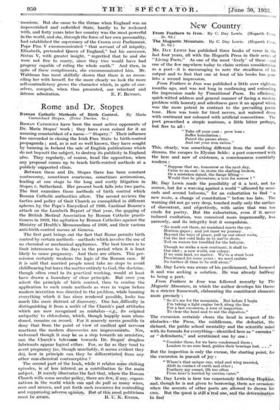Rome and Dr. Stopes
Roman Catholic Methods of Birth Control. By Marie Carmichael Stopes. (Peter Davies. 6s.) ROMAN CATHOLICS have been the most active opponents of Dr. Marie Stopes' work ; they have even coined for it an amusing counterblast of a name—" Stopery." Their influence has succeeded in closing the Irish Free State to birth-control Propaganda; and, as is not so well known, they have sought by banning in Ireland the sale of F.nglish publications which do not boycott the subject, to destroy its publicity in England also. They regularly, of course, head the opposition, when any proposal comes up to teach birth-control methods at a Publicly supported clinic.
Between them and Dr. Stopes there has been constant controversy, sometimes courteous, sometimes acrimonious, leading at one stage to the long and costly litigation in Stopes v. Sutherland. Her present book falls into two parts. The first examines those methods of birth control which Roman Catholic authorities allow. The second reviews the tactics and policy of their Church as exemplified in different spheres ,by the Popes Encyclical of 1930, Cardinal Bourne's attack on the Lambeth Report of that year, the gagging of the British Medical Association by Roman Catholic practi- tioners in 1929, the agitation by Roman Catholics against the Ministry of Health's Memorandum of 1930, and their various anti-birth-control moves at Geneva.
The first part brings out the fact that Rome permits birth
• control by certain methods—methods which involve the use of no chemical or mechanical appliances. The best known is to limit intercourse to the days in the period when it is least likely to cause pregnancy. And there are others. This per- mission certainly weakens the logic of the Roman case. If it is said that married people must take no steps to avoid Childbearing but leave the matter entirely to God, the doctrine, though often cruel in its practical working, would at least - have drawn a boundary of clear principle. But once you admit the principle of birth control, then to 'confine the application to such crude methods as were in vogue before modern" inVention was directed to the problem, while banning everything which it has since rendered possible„ looks too much like mere distrust of discovery. One lais,difficulty in distinguishing it from a serfs Of the Church's past attitudes which are now recognized as mistakes—e.g.', its original antipathY to chloroform, which, though happily -soon aban- doned, remains on record. For it scarcely seems ,possible to deny that 'from the point of View of medical and nervous reactions the modern discoveries are improvements. Nor, welcomed thOughlt may be HS a step towards en armistice, can the Church's tolerance towards Dr. Stops' drugless lubricants appear logical either. For, so far as they tend to avert pregnancy .(as, though unreliably, it seems evident they do), how in principle can, they be differentiated from any other 14-chemical contraceptive ?
The second part of the book,. while, it relates -sotae striking episodes,, is . of less interest, as a contribution to the main subject. It-merely illustrates the tact that, where the Roman Church wills some secular policy, there are few, if any, organi- zations in the world which, can and do pull so many wires, seen and unseen, and put forth such resources. for -.controlling and suppressini adverse opiniOn.: But of this niost politicians










































 Previous page
Previous page